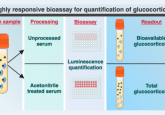Determining personalized dosages using nanosensor technology
Methodology developed for measurement of antibiotic drugs in human serum, with aim of improving understanding of effective drug dosages.
Researchers based at the London Centre for Nanotechnology at University College London (London, UK), along with other collaborators, have developed a new methodology for measuring very small concentrations of antibiotic drug molecules in human blood serum. The study aims to advance the understanding of drug dosages required for different individuals, leading to personalized treatment for patients.
Joseph Ndieyira, lead author of the study, based at the London Centre for Nanotechnology, commented, “This discovery represents a major advance in our fundamental understanding of the pathways between chemical and mechanical signals in a complex media, such as blood serum, and how this information can be used to tune the efficacy of drugs and to minimize the potential toxic side effects.”
The surface stress sensor comprises a surface-coated nanomechanical cantilever array with a model bacterial membrane. This new design can measure the concentration of effective antibiotics and provide an insight into their efficiency against disease-causing pathogens. In order to calculate the optimum dosage (effective enough but less toxic) for each individual, the exact amount of drug bound to serum proteins must be determined on an individual basis.
Ndieyira continued, “Monitoring the levels of active free drugs in serum can be crucial in honing therapeutic solutions for patients to enhance drug administration. This will be particularly helpful in addressing problems with drugs that have to be used in very precise quantities and where there are large differences in how drugs affect individuals and groups. For example, overuse of antibiotics can fuel resistance to drugs or underuse of anesthetics may lead to a patient regaining consciousness during an operation.”
In the future, the team hopes that with a suitably engineered surface probe, the sensor could be paired with customized drug delivery for anesthetics, anticancer, anti-HIV and antibacterial therapies.
Sources: Detecting levels of antibiotics in blood paves the way to individualised treatment; Ndieyira J, Kappeler N, Logan S et al. Surface-stress sensors for rapid and ultrasensitive detection of active free drugs in human serum. Nat. Nanotechnol. DOI: 10.1038/NNANO.2014.33 (2014) (Epub ahead of print).






